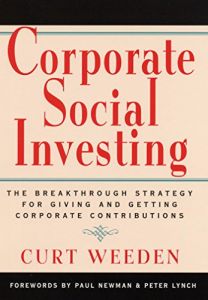Join getAbstract to access the summary!

Join getAbstract to access the summary!
Curt Weeden
Corporate Social Investing
The Breakthrough Strategy for Giving and Getting Corporate Contributions
Berrett-Koehler, 1998
What's inside?
Your company should be giving to charity, but your donations should be subject to the same rigorous standards you’d apply to any other investment. And like “business” investments, your focus should be on returns.
Recommendation
Curt Weeden tells corporations that social investing through charitable contributions can help society, and can be good business. Then he explains why, and how. This detailed guide explains ways to get the most out of each philanthropic investment, benefiting the non-profit organization and the company’s reputation, employee motivation and bottom line. Weeden provides only a few examples of companies that have engaged in corporate social investing, but the introductions by Paul Newman and Peter Lynch are more hands-on because both are active in philanthropy. The book focuses on instructions for setting up your firm’s social investing system. Suggestions cover choosing a non-profit recipient, figuring tax benefits, and other nuts-and-bolts issues. The book is oriented to CEOs and top corporate managers, though getAbstract also recommends it to academics, stockholders and fundraisers. If you are considering social investing, this is a good guide. And if you’re not, it’ll explain why you should. (Note: Tax matters discussed are of U.S. interest only.)
Summary
About the Author
Curt Weeden has been directly or indirectly responsible for more than $1 billion in corporate grants made during the past 20 years. He is a former Johnson & Johnson vice president who directed that corporation’s $146 million-a-year philanthropy program. Previously, he worked as a management consultant with many Fortune 500 companies. He is currently the president of Corporate Contributions Management Academy in Palm Coast, Florida, and consults for private foundations and the J. Seward Johnson, Sr. 1963 Charitable Trust.

















Comment on this summary